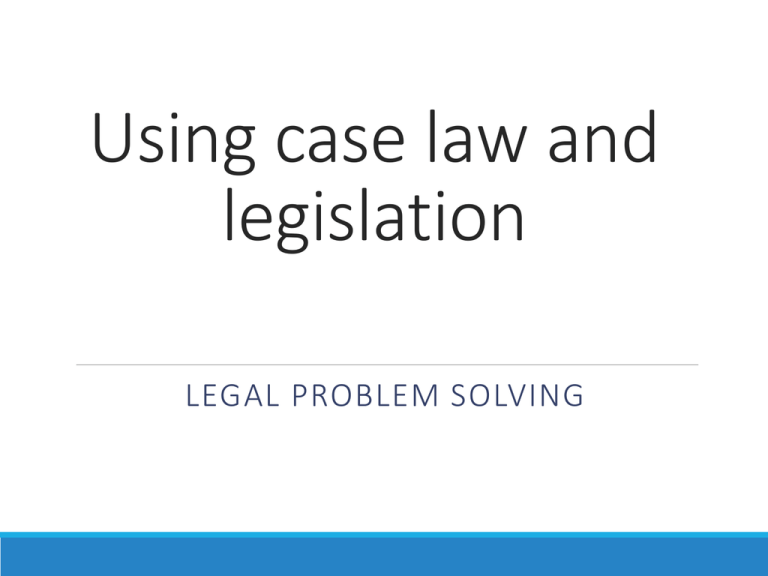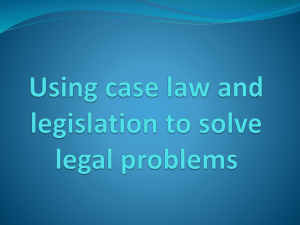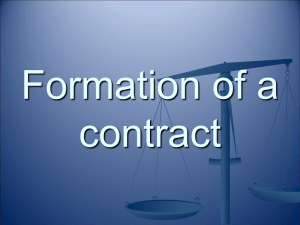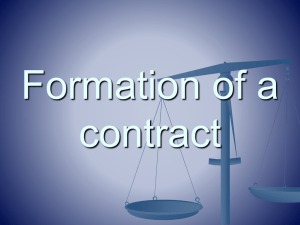Using case law and legislation LEGAL PROBLEM SOLVING
advertisement

Using case law and legislation LEGAL PROBLEM SOLVING Source of legal rights Torts Contract Statute We will look at: Contract ◦Example of use of common law (cases) Australian Consumer Law ◦Example of use of legislation (and interaction with case law) How to use case law and legislation in legal problem solving. What is a contract? How do we know whether or not a contract has been formed? Case law A contract is an agreement that is enforceable at law. Source of law How do we find the law of contracts? Mainly case law ◦ e.g. Carlill v Carbolic Smoke Ball Co [1893] 1 QB 256 Carlill v Carbolic Smoke Ball [1893] 1 QB 256 Unilateral contract Offer can be made to world at large Distinguish offer from invitation to treat by looking at intention of offeror Unilateral contract – offer made at large, but only accepted by those who actually perform Unilateral contract – communication of acceptance not required Consideration can equal detriment/effort OFFER/ACCEPTANCE ANALYSIS OFFER + ACCEPTANCE = AGREEMENT INTENTION CONSIDERATION Offer “the indication by one person to another of his or her willingness to enter into a contract with that person on certain terms” Carter and Harland, “Contract Law in Australia” 4th edn p28 Case law? An offer is not.... A request or the supply of information ◦ Harvey v Facey [1893]AC552 From Harvey to Facey: From Facey to Harvey: From Harvey to to Facey: "We agree buy Bumper Hall Pen for the sum of nine hundred pounds asked by you. Please send us your title "Will you sellprice us Bumper Hall Pen? "Lowest for Bumper deed in order that we may Telegraph lowest cash price-answer early£900.“ possession." HallgetPen paid;” Harvey v Facey “the mere statement of the lowest price at which the vendor would sell contains no implied contract to sell at the lowest price.” Lord Morris at 556 An offer is not... An invitation to treat ◦ Pharmaceutical Society of Great Britain v Boots Cash Chemists (Southern) Ltd [1953] 1QB 401 Examples of Invitations to Treat advertisements/circulars price lists displays of goods in shops calls for bids at auctions, and calls for tenders. So, is every ad an invitation to treat? What do the cases tell us about offers? The offeror must intend to be bound by the offer E.g Harvey v Facey Boots case We can often determine this intention by looking at the amount of detail in the offer (it should contain enough detail to allow a binding contract to come into existence) E.g Carlill v Carbolic Smoke Ball The offer must be communicated to the offeree All cases All an offer needs is a ‘yes’ to make a contract OFFER/ACCEPTANCE ANALYSIS OFFER + ACCEPTANCE = AGREEMENT INTENTION CONSIDERATION Acceptance A FINAL and UNQUALIFIED assent to the terms of an offer made in the manner specified or indicated by the offeror The “yes” which ends negotiations Acceptance must respond to the offer So, only those persons: ◦ to whom the offer was made; and ◦ who have the offer in mind at the point of “acceptance” may accept The Crown v Clarke (1927)40CLR 227 Must accept offer with offer ‘in mind’ R v Clarke “it is not an absolute proposition of law that one who, having the offer before him, acts as one would naturally be induced to act, is deemed to have acted on the faith of or in reliance upon that offer. It is an inference of fact and may be excluded by contrary evidence.” Starke J at 244 Acceptance must be communicated Silence is not sufficient Felthouse v Bindley (1862) 142 ER 1037 OFFER/ACCEPTANCE ANALYSIS OFFER + ACCEPTANCE = AGREEMENT INTENTION CONSIDERATION INTENTION TO CREATE LEGAL RELATIONS To create a contract there must be a common intention of the parties to enter into legal obligations, mutually communicated expressly or impliedly” “ Atkin LJ in Rose & Frank Co v JR Crompton & Bros Ltd [1923] 2 KB 261 at 293 Rebuttable presumptions In social and domestic agreements there is a presumption against legal obligations ◦ Balfour v Balfour [1919] 2 KB 571 ◦ Cohen v Cohen (1929) 42 CLR 91 ◦ Jones v Padavatton [1969] 1 WLR 328 The presumption is rebuttable ◦ Merritt v Merritt [1970] 1 WLR 1211 ◦ Wakeling v Ripley (1951) 51 SR (NSW) 183 Balfour v Balfour “There are agreements between parties which do not result in contracts within the meaning of that term in our law. The ordinary example is where two parties agree to take a walk together, or where there is an offer and acceptance of hospitality. Nobody would suggest in ordinary circumstances that those agreements result in what we know as a contract, and one of the most usual forms of agreement which does not constitute a contract appear to me to be the arrangements which are made between husband and wife…they are not contracts because the parties did not intend that they should be attended by legal consequences.” Atkin LJ at 578 Rebuttable presumptions In business or commercial agreements, there is a rebuttable presumption that the parties did intend to create legal obligations ◦Carlill v Carbolic Smoke Ball [1893] 1 QB 256 ◦Rose & Frank Co v Crompton & Bros Ltd [1925] AC 445 ◦Honour clause OFFER/ACCEPTANCE ANALYSIS OFFER + ACCEPTANCE = AGREEMENT INTENTION CONSIDERATION Consideration... The price paid for the promise Wedding cake As well, Mavis is being threatened with legal action by Chrissie Saranrap. Chrissie was married a month ago and was expecting Mavis to provide her specialty – the “nouveau doveau” - a tiered tower of cupcakes, iced in white and arranged to resemble the wings of doves – as the centrepiece cake for her wedding reception. Mavis loves doing cakes for weddings – in fact she now makes more money from doing wedding cakes than she does from her regular cooking classes. Chrissie saw information about Mavis’ cake services after an article in the local paper, and called round to see Mavis, and look at the different cakes she could make. They discussed possibilities and pricing and Chrissie left with a price list. Apparently, Chrissie called and left Mavis a message on the answering machine ordering the “nouveau doveau” for her wedding, to be delivered on 2nd May at the wedding reception, for $2,000 COD. In her message, Chrissie had said: “If I don’t hear to the contrary, I’ll assume everything is OK. Call me if there is a problem – otherwise I will see you on the 2nd. Looking forward to your lovely creation.” Unfortunately, because of all the work being done to the kitchen and problems with electrical work and electrical supply, Mavis had experienced a number of black outs which had interrupted her answering machine. Mavis – never received the message from Chrissie, and so of course, had not provided the cake. Chrissie is very angry and claims her wedding was ruined without the cake. She has threatened to sue Mavis.


